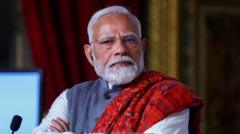The upcoming summit between Indian Prime Minister Narendra Modi and President Donald Trump in Washington is highly anticipated, with leaders expected to exchange warm greetings and share light-hearted moments. However, behind the camaraderie lies a pressing agenda focused on trade, tariffs, and diplomatic visas. Over the years, Modi and Trump have cultivated a strong rapport, bolstered by their shared objectives of countering China's influence. Their relationship has been characterized by strategic high-profile meetings since their initial encounter in 2017.
As Modi prepares for his visit, he is reportedly set to engage with various members of the Trump administration, including discussions with American business leaders and perhaps even tech mogul Elon Musk, particularly regarding India's expanding electric vehicle sector. Yet, while the personal connection is significant, the realities of their nations' economic relationship cannot be overlooked.
Modi's administration has already made strides such as reducing tariffs and accepting the return of undocumented Indian immigrants, setting the stage for productive discussions with Trump. Expectations for additional concessions, such as further tariff reductions aimed at alleviating the substantial US trade deficit with India, may emerge. Conversely, Modi might advocate for a bilateral economic partnership to facilitate reciprocal tariff reductions, acknowledging the potential advantages of a more favorable trade arrangement.
The issue of undocumented Indians in the US will likely be another critical point, given that India is home to the third-largest group of such immigrants. Navigating this delicately, Modi will aim to ensure that Indian citizens are treated fairly during deportation processes.
The energy dialogue could be two-fold, with Trump potentially pushing for increased Indian purchases of American oil while Modi may seek enhancements in US investment in India's nuclear energy sector. This tactic could allow India to present nuclear energy as a cleaner alternative to fossil fuels in negotiations.
Moreover, technology cooperation remains a pivotal area of discussion, particularly the Initiative on Critical and Emerging Technologies (iCET) that has gained traction in bilateral relations. Modi is expected to seek reassurances that both parties will remain committed to advancing this initiative. Additionally, he may press Trump to uphold the H-1B visa program, crucial for Indian tech workers in the US job market.
Further complexities could arise from the geopolitical landscape, particularly regarding India's collaboration with Iran on the Chabahar port project. Modi's discussions with Trump may involve seeking clarity on the implications of the US's stance on Iran, especially given the broader context of Trump’s "maximum pressure" campaign against Tehran.
On foreign policy matters, discussions about the ongoing conflicts in Ukraine and Gaza may also be on the agenda, with Modi potentially offering to act as a mediator if conditions allow.
Despite these pressing issues, both leaders are likely to maintain a positive outlook on their discussions, particularly regarding the Indo-Pacific Quad alliance, which focuses on countering Beijing. Plans for an upcoming Quad meeting in India might provide a platform for further collaboration.
This convergence of personal rapport and strategic dialogue underscores the evolving US-India partnership as both nations seek to navigate a complex geopolitical environment while addressing their respective economic interests.
As Modi prepares for his visit, he is reportedly set to engage with various members of the Trump administration, including discussions with American business leaders and perhaps even tech mogul Elon Musk, particularly regarding India's expanding electric vehicle sector. Yet, while the personal connection is significant, the realities of their nations' economic relationship cannot be overlooked.
Modi's administration has already made strides such as reducing tariffs and accepting the return of undocumented Indian immigrants, setting the stage for productive discussions with Trump. Expectations for additional concessions, such as further tariff reductions aimed at alleviating the substantial US trade deficit with India, may emerge. Conversely, Modi might advocate for a bilateral economic partnership to facilitate reciprocal tariff reductions, acknowledging the potential advantages of a more favorable trade arrangement.
The issue of undocumented Indians in the US will likely be another critical point, given that India is home to the third-largest group of such immigrants. Navigating this delicately, Modi will aim to ensure that Indian citizens are treated fairly during deportation processes.
The energy dialogue could be two-fold, with Trump potentially pushing for increased Indian purchases of American oil while Modi may seek enhancements in US investment in India's nuclear energy sector. This tactic could allow India to present nuclear energy as a cleaner alternative to fossil fuels in negotiations.
Moreover, technology cooperation remains a pivotal area of discussion, particularly the Initiative on Critical and Emerging Technologies (iCET) that has gained traction in bilateral relations. Modi is expected to seek reassurances that both parties will remain committed to advancing this initiative. Additionally, he may press Trump to uphold the H-1B visa program, crucial for Indian tech workers in the US job market.
Further complexities could arise from the geopolitical landscape, particularly regarding India's collaboration with Iran on the Chabahar port project. Modi's discussions with Trump may involve seeking clarity on the implications of the US's stance on Iran, especially given the broader context of Trump’s "maximum pressure" campaign against Tehran.
On foreign policy matters, discussions about the ongoing conflicts in Ukraine and Gaza may also be on the agenda, with Modi potentially offering to act as a mediator if conditions allow.
Despite these pressing issues, both leaders are likely to maintain a positive outlook on their discussions, particularly regarding the Indo-Pacific Quad alliance, which focuses on countering Beijing. Plans for an upcoming Quad meeting in India might provide a platform for further collaboration.
This convergence of personal rapport and strategic dialogue underscores the evolving US-India partnership as both nations seek to navigate a complex geopolitical environment while addressing their respective economic interests.



















